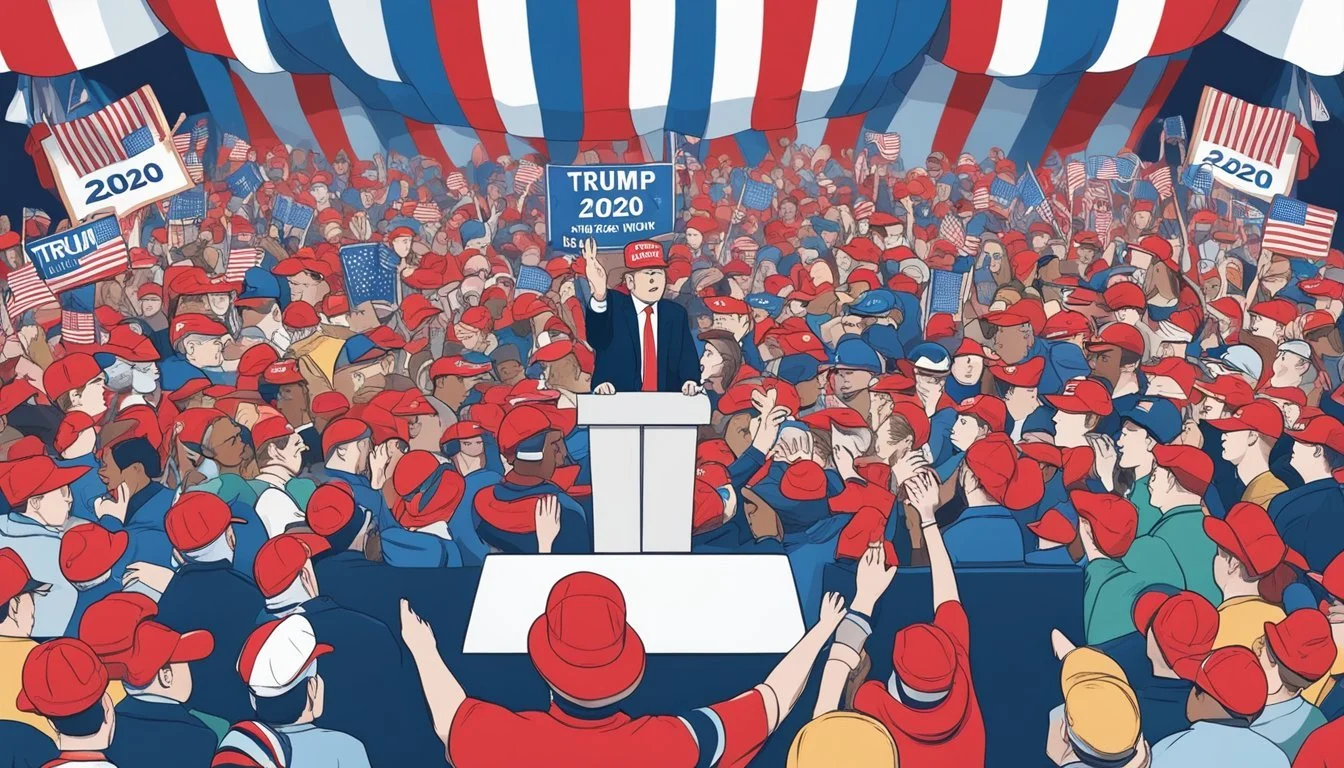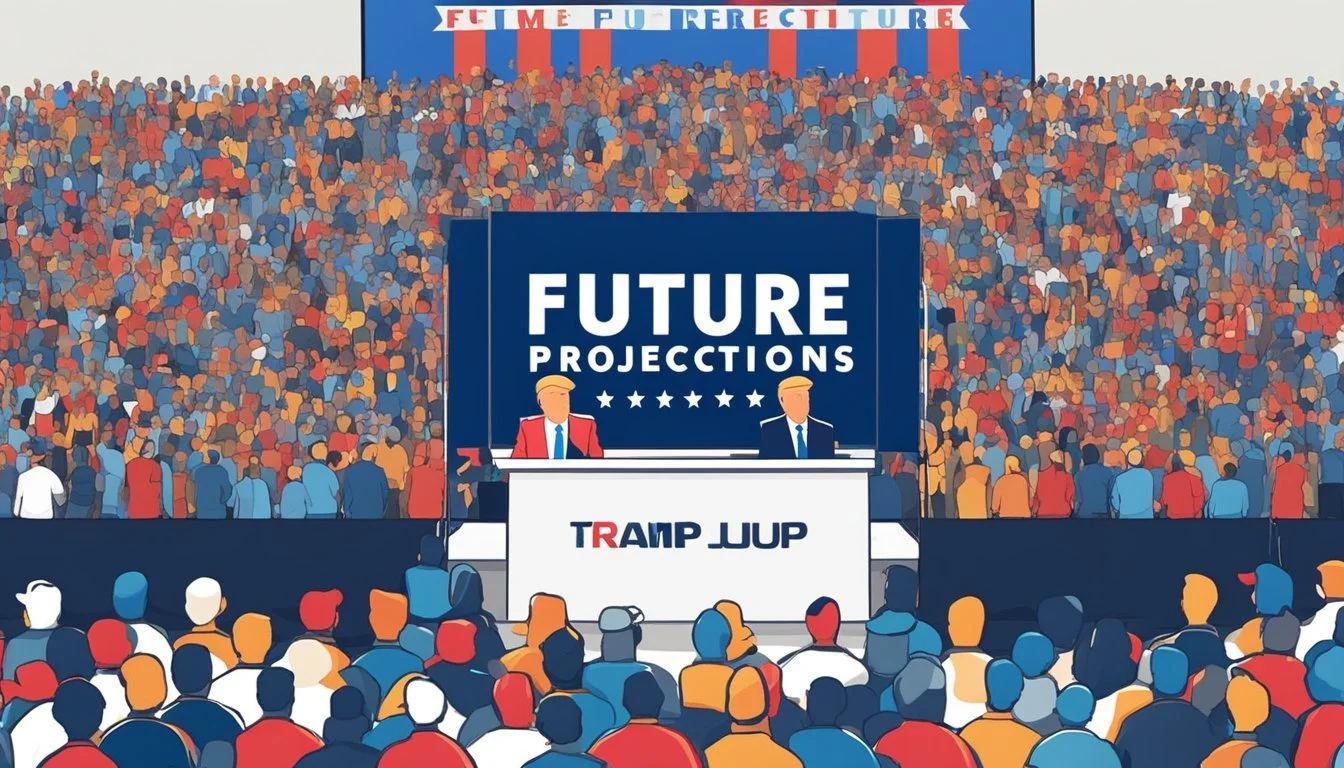Trump Ramps Up Electoral Efforts in Final Stretch
Donald Trump's campaign for the 2024 presidential election has reignited the political landscape. The former president announced his bid for a second term, resurrecting familiar proposals from his first administration while introducing new policy agendas. Trump's campaign promises include a mix of economic, social, and foreign policy initiatives aimed at appealing to his base and attracting new supporters.
With just days remaining until Election Day, Trump has intensified his campaign efforts, holding rallies in key swing states like Wisconsin. These events serve as a platform for Trump to energize his supporters and outline his vision for America's future. The Republican candidate faces a competitive race, with Democratic strongholds in major cities posing a challenge to his electoral strategy.
Trump's 2024 campaign has drawn significant attention, both from supporters and critics. As the election approaches, political analysts are closely watching how his message resonates with voters and how it might shape the outcome of this highly anticipated presidential race.
Campaign Overview
Donald Trump's 2024 presidential campaign centers on familiar themes from his previous run. The campaign emphasizes "America First" policies, promises to "Make America Great Again," and outlines specific policy proposals aimed at addressing key issues.
Campaign Promises
Trump's 2024 campaign revives several promises from his first term while introducing new proposals. He pledges to secure the southern border, potentially by completing the border wall. Economic policies include tax cuts and deregulation to stimulate growth. Trump vows to combat crime by supporting law enforcement and cracking down on violent offenders. He promises to prioritize American energy independence through increased domestic oil and gas production. The campaign also focuses on education reform, proposing school choice initiatives and restrictions on certain curricula.
America First Policy Agenda
The "America First" agenda remains central to Trump's campaign. This approach emphasizes prioritizing U.S. interests in international affairs and trade negotiations. Trump proposes renegotiating trade deals to benefit American workers and manufacturers. He advocates for reduced military involvement overseas while strengthening national defense capabilities. The agenda includes plans to confront China economically and diplomatically. Trump also aims to reform immigration policies, focusing on merit-based systems and stricter enforcement measures.
Make America Great Again Messaging
"Make America Great Again" (MAGA) continues as the campaign's core slogan. This messaging taps into nostalgia for past American prosperity and global influence. Trump frames his candidacy as a return to traditional values and economic strength. Campaign rallies feature patriotic themes and emphasize American exceptionalism. The MAGA brand extends to merchandise and social media campaigns. Trump portrays himself as a political outsider fighting against establishment forces. The messaging highlights perceived achievements from his first term and promises to build upon them if re-elected.
Policy Proposals
Donald Trump's 2024 campaign outlines an ambitious policy agenda spanning multiple areas of governance. His proposals aim to reshape key aspects of American life, from immigration to the economy.
Immigration Reform
Trump pledges to reinstate and expand his previous border policies. He proposes completing the border wall construction and implementing a "remain in Mexico" policy for asylum seekers. The campaign advocates for ending birthright citizenship for children of illegal immigrants.
Trump calls for increased deportations and stricter vetting of immigrants. He aims to ban entry from certain countries deemed security risks.
Tax and Economic Policies
The campaign supports extending the 2017 Tax Cuts and Jobs Act provisions. Trump proposes further reducing the corporate tax rate to 15%. He advocates for eliminating income taxes on Social Security benefits.
Trump plans to impose significant tariffs on imported goods, aiming to incentivize domestic manufacturing. He argues this will create jobs, despite economists' warnings of potential consumer price increases.
Health and Social Programs
Trump promises to protect Medicare and Social Security. He proposes allowing Medicare to negotiate drug prices to lower costs for seniors.
The campaign supports repealing and replacing the Affordable Care Act. Trump advocates for expanding health savings accounts and increasing price transparency in healthcare.
Defense and National Security
Trump pledges to strengthen the U.S. military and modernize nuclear capabilities. He proposes expanding missile defense systems to counter threats from nations like North Korea and Iran.
The campaign advocates for reducing U.S. involvement in foreign conflicts. Trump aims to renegotiate defense agreements with allies, pushing for increased financial contributions.
Energy and Environment
Trump promises to boost American energy production, focusing on oil, natural gas, and coal. He proposes expanding offshore drilling and opening more federal lands for energy exploration.
The campaign rejects climate change policies that could harm economic growth. Trump plans to withdraw from international climate agreements and roll back environmental regulations.
Education Policies
Trump supports expanding school choice programs, including charter schools and vouchers for private education. He proposes redirecting federal education funds to follow students to their chosen schools.
The campaign advocates for promoting patriotic education in schools. Trump plans to cut federal funding for schools teaching critical race theory or "radical" gender ideologies.
Key Political Positions
Donald Trump's 2024 campaign emphasizes several core policy areas that have defined his political brand. His platform focuses on domestic security, electoral reform, international relations, and technological advancement.
Law and Order
Trump advocates for a tough-on-crime approach. He proposes increasing funding for law enforcement and expanding police powers. His plan includes harsher penalties for violent offenders and drug dealers.
Trump supports reinstating controversial policies like stop-and-frisk. He calls for greater use of the death penalty in federal cases.
The former president aims to crack down on illegal immigration. He pledges to finish constructing the southern border wall and implement stricter deportation measures.
Election Integrity and Voter Fraud
Trump continues to claim widespread voter fraud occurred in the 2020 election. He proposes significant changes to voting procedures.
His plan includes mandatory voter ID laws in all states. Trump wants to limit mail-in voting and early voting periods.
He calls for paper ballots and hand counting in all elections. Trump advocates for cleaning voter rolls more aggressively to remove ineligible voters.
The campaign pushes for increased poll watching and stricter chain of custody rules for ballots.
Foreign Affairs and Trade
Trump promotes an "America First" foreign policy. He pledges to reduce U.S. involvement in international conflicts and organizations.
The former president vows to renegotiate trade deals he views as unfair to American workers. He supports maintaining or increasing tariffs on imports, particularly from China.
Trump promises to strengthen ties with Israel and expand the Abraham Accords. He advocates for a tougher stance on Iran and North Korea.
His platform includes reducing U.S. contributions to NATO and demanding allies increase their defense spending.
Infrastructure and Innovation
Trump proposes a major infrastructure overhaul. His plan focuses on repairing roads, bridges, and airports across the country.
The campaign promotes investment in emerging technologies. Trump envisions the creation of "Freedom Cities," high-tech urban centers built from scratch.
He supports research into flying cars and other futuristic transportation methods. Trump calls for expanding 5G networks and improving rural internet access.
The former president advocates for increased domestic energy production, including oil, natural gas, and coal.
Campaign Strategy
Donald Trump's 2024 campaign employs a multi-faceted approach focused on key battleground states, energizing his base through rallies, leveraging media attention, and navigating complex Republican Party dynamics.
Targeted States and Voter Demographics
Trump's campaign prioritizes swing states crucial for Electoral College victory. Key targets include Pennsylvania, Michigan, Wisconsin, and Florida. The strategy emphasizes mobilizing Trump's core supporters - primarily white working-class voters in rural and suburban areas.
The campaign also aims to expand outreach to Hispanic and Black voters, particularly in states like Florida and Georgia. Trump's team believes his economic message and tough-on-crime stance can resonate with these demographics.
Voter turnout efforts focus on areas that underperformed in 2020, with increased ground operations and targeted digital advertising. The campaign utilizes extensive data analytics to identify and motivate potential Trump voters.
Rallies and Public Appearances
Large-scale rallies remain a cornerstone of Trump's campaign strategy. These events, often held in key battleground states, serve multiple purposes:
Energizing the base and generating enthusiasm
Attracting media coverage
Testing and refining campaign messaging
Collecting voter data for future outreach
Trump's appearances often feature high-profile Republican supporters, including figures like J.D. Vance. The campaign also organizes smaller, more targeted events in critical counties and districts.
Communication and Media
Trump's media strategy revolves around dominating news cycles and bypassing traditional media filters. Key elements include:
Frequent use of social media platforms to communicate directly with supporters
Strategic interviews with friendly media outlets
Provocative statements designed to generate headlines and drive discourse
Rapid response team to counter negative coverage and attacks from political opponents
The campaign leverages Trump's celebrity status and media savvy to maintain a constant presence in the news. This approach aims to control the narrative and keep Trump at the forefront of public attention.
Republican Party Relations
Trump's relationship with the Republican Party establishment remains complex. His campaign strategy involves:
Consolidating support among loyalists within the party
Pressuring potential dissenters to fall in line
Leveraging his influence over the party base to shape policy positions
The campaign works to present a united front with the Republican National Committee while maintaining Trump's image as a political outsider. This delicate balance aims to maximize party resources while preserving Trump's anti-establishment appeal.
Endorsements from key Republican figures are actively sought to bolster Trump's credibility within the party. The campaign also targets "Never Trump" Republicans, seeking to neutralize internal opposition.
Challenges and Controversies
Donald Trump's 2024 campaign faces significant obstacles and scrutiny. Legal issues, public perception concerns, and strong opposition from political rivals shape the landscape as he seeks reelection.
Legal Investigations and Impeachment
The Justice Department's investigations loom over Trump's campaign. He faces multiple criminal indictments related to his handling of classified documents and efforts to overturn the 2020 election results. These legal challenges consume campaign resources and media attention.
Trump's two impeachments by the House of Representatives remain a point of contention. While acquitted by the Senate, the proceedings highlighted deep political divisions.
The former president continues to dispute the 2020 election outcome. His claims of fraud, though repeatedly rejected in court, resonate with his base but alienate other voters.
Public Perception and Media Critique
Trump's relationship with the media remains contentious. Major news outlets scrutinize his statements and policy positions, often fact-checking in real-time.
His handling of the COVID-19 pandemic, including conflicts with the World Health Organization, continues to impact public opinion. Critics question his leadership during the crisis.
Trump's strong stance on crime and guns appeals to his core supporters. However, it draws criticism from those advocating for stricter gun control measures.
Political Opposition
The Democratic nominee and their running mate present a united front against Trump's reelection bid. They highlight policy differences on healthcare, climate change, and economic issues.
Trump faces challenges within the Republican Party. Some party members distance themselves from his more controversial positions and rhetoric.
His campaign strategy of attacking opponents, including referring to Kamala Harris, mirrors his 2016 and 2020 approaches. This tactic energizes his base but risks alienating moderate voters.
Historical Context
Donald Trump's presidential campaigns occurred during pivotal moments in American political history. His unconventional approach and populist messaging reshaped the electoral landscape.
Previous Presidential Term
Barack Obama served as president from 2009 to 2017. His administration focused on healthcare reform, economic recovery, and climate change initiatives. Obama's presidency saw the passage of the Affordable Care Act and the legalization of same-sex marriage nationwide.
The 2016 election took place against this backdrop of progressive policies and growing political polarization. Trump positioned himself as a stark contrast to Obama's approach, appealing to voters who felt left behind by globalization and demographic shifts.
Historical Campaigns and Elections
The 2016 presidential election broke from traditional campaign norms. Trump, a political outsider, defeated a field of experienced Republican candidates in the primaries. His campaign relied heavily on social media and large rallies to energize supporters.
In the general election, Trump faced Hillary Clinton, the first woman nominated by a major party. Despite losing the popular vote, Trump secured an Electoral College victory with 304 votes to Clinton's 227.
Trump's 2020 reelection campaign began unusually early, with his first rally held on February 1, 2017. He faced no significant Republican opposition for the nomination. The 2020 election occurred during the COVID-19 pandemic, dramatically altering campaign strategies and voting methods.
Impact and Analysis
Donald Trump's campaign has far-reaching implications across economic, social, and international spheres. His policy proposals and rhetoric shape public discourse and influence key areas of American life.
Economic Implications
Trump's economic platform centers on tax cuts and deregulation. His campaign proposes extending the 2017 Tax Cuts and Jobs Act provisions and reducing the corporate tax rate to 15%. This approach aims to stimulate business growth and job creation.
Tariffs play a significant role in Trump's economic strategy. He advocates for their use as a negotiating tool in international trade, particularly with China. This stance could impact global supply chains and consumer prices.
The campaign's fiscal plans would increase the national debt by $7.5 trillion through 2035, according to analysis. This projection raises concerns about long-term economic stability and government spending capabilities.
Social and Cultural Impact
Trump's campaign rhetoric continues to polarize the American public. His statements on immigration and border security, including support for Customs and Border Protection expansion, resonate with his base but face criticism from opponents.
The campaign's stance on federal law enforcement has evolved since his previous term. Trump now calls for increased funding and support for police departments nationwide, contrasting with some rival policies.
Social media plays a crucial role in Trump's campaign strategy. His use of platforms to communicate directly with supporters shapes public discourse and challenges traditional media narratives.
International Relations
Foreign policy remains a key focus of Trump's campaign. He advocates for a reduced U.S. military presence abroad and criticizes NATO allies' defense spending levels.
The Russia-Ukraine war features prominently in Trump's foreign policy discussions. He promises to quickly end the conflict if elected, though specifics remain unclear.
Trump maintains a hardline stance on China, proposing restrictions on Chinese ownership of U.S. assets and infrastructure. This approach could significantly impact U.S.-China relations and global economic dynamics.
The campaign reaffirms support for travel bans from certain countries, citing national security concerns. This policy stance continues to generate debate over its effectiveness and impact on international relations.
Future Projections
Donald Trump's 2024 campaign strategy focuses on key battleground states and policy promises aimed at his base. His team is preparing for potential outcomes while outlining a long-term vision for the Republican party.
Projected Campaign Outcomes
Trump's path to victory hinges on winning crucial swing states. Georgia, where he lost by a narrow margin in 2020, is a key target. His campaign has intensified efforts there to secure victory.
The race remains tight, with polls showing a close contest between Trump and Vice President Kamala Harris. Forecasts suggest Trump has a 70% chance of winning the popular vote.
Trump's team is preparing for various scenarios, including the possibility of winning the Electoral College while losing the popular vote. They are focusing resources on states that could tip the balance.
Potential Policy Changes
If elected, Trump plans to revive and expand policies from his first term. His agenda includes:
Stricter immigration enforcement
Tax cuts for businesses and individuals
Deregulation of industries
Renegotiation of international trade deals
Trump has promised to implement "Project 2025," a plan to reshape federal agencies and policies. This initiative aims to reduce the power of career bureaucrats and align government functions with his vision.
Long-term Political Strategy
Trump's campaign is not just focused on 2024, but on shaping the Republican party's future. His strategy includes:
Cultivating a new generation of Trump-aligned politicians
Maintaining influence over party nominations
Expanding the GOP's appeal to working-class voters
The campaign is working to solidify Trump's base while reaching out to new voter demographics. They are emphasizing economic policies and "America First" principles to broaden support.
Trump's team is also developing plans to cement his legacy beyond his potential second term, aiming to influence party direction for years to come.






